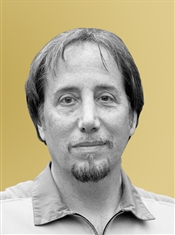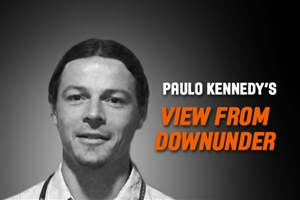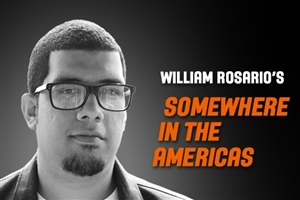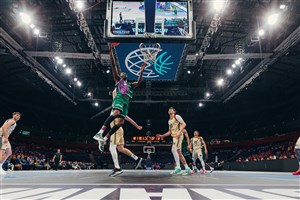
Junius Kellogg was a sure bet
Charlotte (Steve Goldberg's Wheel World) - Even when sitting in a wheelchair, Junius Kellogg was a big man. An NWBA Hall of Famer as a coach of top club teams as well as the 1964 USA Paralympic squad, he was a former collegiate star and was playing with the Harlem Globetrotters in 1954 when a car accident left him paralyzed.
In 1951, he was arguably the most famous person in the United States.
Speaking at the Bloomberg Business Summit in New York this week, NBA Commissioner Adam Silver said something that brought Kellogg to mind.
Silver told anyone listening that the league will eventually profit from legalized gambling on sports. This is a pretty significant statement as gambling has always been seen as a bit problematic for sports in America. Even though casinos are now a sponsor category for NBA teams, only Nevada has legal sports betting in the U.S. This must seem quaint to the rest of the world.
It's never been about the betting. That's been happening, legal or otherwise for as long as there's been competition or currency. Odds were 6 to 1 that Eve was going take a bite of that apple.
The problem has always been about the integrity of the competition in the face of what some bettors would do to sway the outcome and the ability of the competitors to resist either temptation or threat.
Which brings me back to Kellogg.
In 1950, the same year Earl Lloyd became the first African-American player in the NBA, Junius Kellogg, a tall gangly kid from Portsmouth, Virginia became the first African-American basketball player on scholarship for Manhattan College. This was a big deal as New City schools were amongst the best in the country.
While college games sold out Madison Square Garden, the NBA's New York Knicks played in a converted armory where seats were easy to find.
During his sophomore year, an older teammate, in fact a captain from the previous season, came by his room after practice. Kellogg thought this was odd because Henry Poppe had all but ignored him previously and other players had told him that Poppe had issues with the team’s integration.
How was it now that Poppe wanted to be pals? He stopped into Kellogg's dorm room with a proposition.
They were going to play favored De Paul University at the Garden and the betting line was 3 points. Poppe wasn’t there to inspire his team’s leading scorer to play harder. He actually wanted Kellogg to help make sure his team lost by at least five or six points. And not for nothing.
"He offered me $1,000," Kellogg was quoted as saying in a New York Times story. From a poor family in Virginia, that had to be enticing.
Yet said Kellogg, "I told him to get the hell out of my room."
He wasn't done. So bothered was he by the concept of throwing the game, Kellogg went to Kenny Norton, the Manhattan coach, who in turn sent him to see the District Attorney.
Kellogg felt terrible about implicating his teammate but he had to do the right thing. He wasn't totally selfless.
"I didn't want to hurt the guy," Kellogg said, "but I had to do it. If at any time in the future that guy decided to tell someone he came to see me, my scholarship was gone."
Next time it was the gamblers who approached Kellogg, meeting at a neighborhood bar. Working with d the District Attorney, Kellogg was wired for sound.
As recounted in the New York Times story on his passing, the gamblers told him to "throw hook shots over the basket" and "miss rebounds occasionally". Kellogg declined, and Manhattan won the game 62-59. Hours later, the police made the first arrests.
It was far bigger than Kellogg could have ever imagined. In what became a national scandal, 32 players from seven colleges admitted to taking bribes to fix 86 games in 17 states between 1947 and 1950. That included seven players from the City College of New York (CCNY) team that won the only big double in history in 1950 by taking both the National Invitation Tournament (NIT) and the National Collegiate Athletic Association (NCAA) tournament.
"I didn't realize the enormity of the situation," Kellogg said. "I was just this naive kid."
There was praise for the brave young man but also a number of credible threats. A guard was posted at his dormitory room and the police advised him and his roommate not to use the bed by the window.
The power structure of basketball in New York was about to change with the professional game taking the lead. Kellogg would never play in the NBA though.
He joined one of the most famous teams ever, the Harlem Globetrotters and was on his way to a game in Arkansas in a car with four other players when a tire blew. The car flipped wildly and all were ejected. Only Kellogg was hurt seriously. His spine was injured and his big-time playing career was over.
Learning the wheelchair game, he coached the Pan Am Jets from 1957 to 1964, winning the NWBA Championship in 1959. That success led to head coach jobs for the USA’s Stoke Mandeville Games teams in 1957, 1958, 1959, and 1961. He led the U.S. men’s team at the second Paralympics in Tokyo 1964. Back in New York, he coached the Brooklyn Whirlaways from 1973-77 and from 1966 until his death, he worked for New York City, becoming the first deputy commissioner and director of strategic planning for the Community Development Agency.
Most importantly, the 6ft 8in (2.04m) Junius Kellogg was a man of principle and integrity. He passed away at age 71 in 1998.
In recalling the turmoil set loose by his actions, Bob Otten, his college roommate, told the New York Times, "I never - and I mean never - heard him complain once."
To which Kellogg responded: "Complain about what? I can't complain about my life. Too many good things have already happened."
Steve Golberg
FIBA
FIBA's columnists write on a wide range of topics relating to basketball that are of interest to them. The opinions they express are their own and in no way reflect those of FIBA.
FIBA takes no responsibility and gives no guarantees, warranties or representations, implied or otherwise, for the content or accuracy of the content and opinion expressed in the above article.
To help make this column as inclusive as possible, please send any national or international event information, story suggestions, or comments to wheelworldmail@gmail.com.

















